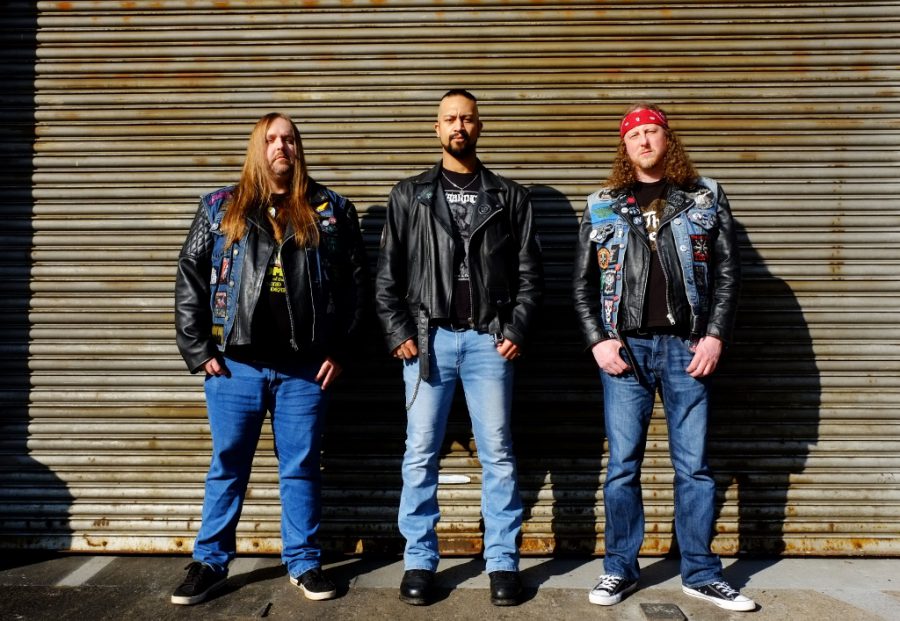
Metal gaat continu door veranderingen heen, al sinds Black Sabbath voor het eerst die donkere tonen aansloeg onder de rook van Birmingham in de late jaren zestig. Nieuwe genres vliegen je om de oren en vreemde cross-overs doen het goed. Toch blijven sommige dingen gewoon bij het oude en Iron Void is daar een prima voorbeeld van.
Doom, en zijn klassieke, epische variant, zijn een redelijk betrouwbaar slag metal. Er zijn hele festivals gewijd aan de net wat tragere en donkerdere broer van de heavy metal die eigenlijk altijd dicht tegen de klanken van pioniers als Black Sabbath, Saint Vitus, Pentagram en Cirith Ungol aanschuurt. Het Engelse Iron Void bracht zojuist een plaat uit die ook prima in dit hele beeld past. ‘Excalibur’ draait om glorie en verval, om zwaarden en ridders. Traditionele materie met een traditioneel geluid.
Door Guido Segers
Toch doet doom het nog altijd uitstekend en zelfs quasi-innovatieve bands gooien hoge ogen. Denk aan een Pallbearer of Hamferð, maar ook aanhoudende populariteit van Pagan Altar en Solstice. Er kwam zelfs een boek uit: het Doom Metal Lexicanum (deel 2 is in de maak). Gelukkig wilde Iron Void ons meer vertellen over die blijvende passie voor het genre en namen oprichter Jonathan ‘Sealey’ Seale, Steve Wilson en Scott Naylor de tijd om onze vragen te beantwoorden.
How is Iron Void doing?
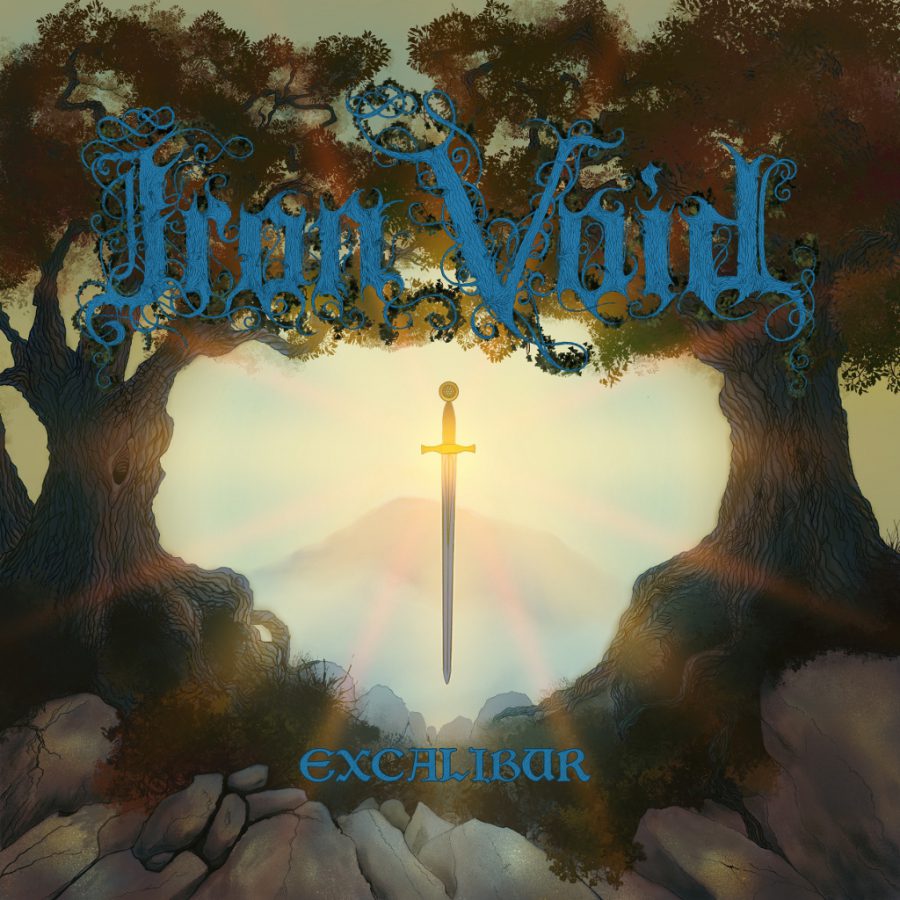
Jonathan ‘Sealey’ Seale:
Very well, thanks! We’ve had a good start to the year playing our first two shows with our new drummer, Scott Naylor. We played at Siege of Limerick in Ireland and Little Devil Doom Day in Tilburg, the Netherlands. Both shows were fantastic, the audiences were great and Scott has been very warmly received by our fans which is really nice.
You’ve just released an Arthur themed album, what made you go for this topic?
Sealey:
I’ve been fascinated by the Arthurian legends ever since I was a child. Around a decade ago I visited Tintagel Castle in Cornwall which is allegedly the birthplace of King Arthur. I was blown away by the breath-taking natural beauty of the place and felt very much inspired to write music based upon the legends. One of my favourite films of all time is also “Excalibur” by John Boorman which was released in 1981. I originally suggested doing a song about it to Steve, but I soon realised one song alone wouldn’t do the subject matter justice so the idea quickly developed into a concept album based on the film, the book “Le Morte D’Arthur” by Sir Thomas Malory (which the film is based on), “Idylls of The King” by Alfred, Lord Tennyson and various other sources.
For Iron Void this is the first time you did an album on one topic. A concept album if we may call it that. What was it like to write and record such a connected piece?
Sealey:
A lot of time on my part was spent reading Arthurian literature and researching every aspect of the myths. It took 10 years from initial idea to finished product. Once we started writing the music the album actually took shape very naturally. Recording it was the most challenging experience we’ve had in the studio so far. It was pretty straightforward recording the instruments. I know Steve really made a lot of effort with his guitar solos on this record. Chris Fielding (Engineer / Co-Producer) also wanted to push the vocals much more than on previous records and to explore the duel vocal attack. Steve and I were stretched to the limits of our abilities and we certainly gave our all during the vocal takes. We disagreed quite passionately on some things and Steve got so pissed off at one point that he stormed out of the control room! But you know what? That’s a good thing cos he believes so strongly in what we’re doing and just wants to make sure it’s the best it can be. Same goes for Chris and I. We’ll definitely be working with him again on the next record.
Steve:
I did get frustrated recording vocals at one point, but later on we tried some more harmonies and it led to the “Lancelot” verses and some harmonies for “Dragon’s Breath” that worked a lot better than they had in rehearsals. It was a challenge. Some of the rhythm guitar parts that seemed easy during writing were actually quite tricky to play tight enough when it came to recording. We’re really happy with how it came out and it was enjoyable to record, just tough in places.
The fantasy/myth theme really fits your type of classical doom sound. Who would you consider the main inspirations for Iron Void?
Sealey:
We’re influenced by films, literature, myths and legends and real-life subjects lyrically. As for our musical inspirations, we originally started Iron Void with the intention of forming a traditional Doom Metal band worshipping at the altar of Black Sabbath (in all their incarnations I might add!), Saint Vitus, Pentagram, Trouble, Cathedral, Sleep, the Maryland Doom scene and classic Heavy Metal such as Judas Priest, Iron Maiden, Thin Lizzy, Motorhead, Venom and others. Not much has changed since really, our approach is still the same nowadays but we’re better musicians and the sound is a bit more polished I guess.
Steve:
I agree completely with the musical influences. We tend to draw lyrical inspiration from darker subjects. We have a couple of ideas lined up for new songs, too. It was a nice change to have a focused subject that we could stick to with “Excalibur”. We didn’t have the feeling of being stuck for ideas as we knew we were going to piece together the Arthur legend one song at a time.
Which album tracks are for you the highlights and why? And which were hardest to sing, because it does feel like a challenging album.
Sealey:
Some of my personal favourites from “Excalibur” are “Dragon’s Breath”, “Lancelot of The Lake”, “Enemy Within” and “A Dream To Some, A Nightmare To Others”. I just really like these particular tracks, I love listening to the album in its entirety as that’s the way I intended it to be experienced when we wrote it but these songs stand out for me personally. “Avalon” is also a great way to end the album and Steve did an awesome job with this song. The hardest song to sing for me is definitely “Lancelot” as it’s at the top of my vocal range. As I said previously, we really tried to push ourselves on this record and I think that’s apparent to the listener with a keen ear.
Steve:
“Avalon” was a challenge in that it was just me on my own – one guitar and then vocal tracks. Getting the guitar part right was tricky. I had to concentrate on finger picking and remembering how many times to play each section without vocals. There were a few takes involved but it was done in one early afternoon session. Vocals were actually easier than the guitar once I’d warmed up. I recorded a demo at home months before we recorded and it was very close except I used a clean electric guitar and the original lyric was “my children” which we changed to “my kingdom” on the album.
My favourite ‘heavy’ song would have to be “The Death of Arthur”. I’m really proud of the melody line that opens and closes the track. I wanted it to sound like a film theme tune to represent the final battle between Mordred and Arthur. I think we got it just right.
Scott:
The most enjoyable songs to play in my short time in the band have been “Lancelot…” and “The Coming of A King” from the “Excalibur” release and a number of old fan, not to mention personal, favourites. Namely, “I Am War”, “The Devil’s Daughter” and “Gates of Hell’ from the self-titled debut and ‘Doomsday’ releases. I’m very much looking forward to getting my chops around more of the “Excalibur” material, giving these two reprobates further opportunity to air the tracks in a live capacity and creating and writing for the upcoming release, “IV”.
You’ve been active in the doom scene for a good two decades, has much changed in the scene?
Sealey:
There’s more of an audience for it nowadays and there’s definitely more festivals dedicated to this style which is great. However, I do sometimes feel that some of the modern fans don’t respect the older bands and their legacies enough and as much as they should do and I’m not talking about us either. I don’t know, maybe I’m just getting bitter and jaded in my old age but that’s the way I feel. There’s too much focus on the ‘Riff’, effects pedals and amps and not enough focus on quality songwriting. It is good to know Doom Metal is finally being accepted and people actually do know what it is these days. When we first started even some hardened, dyed in the wool Metal fans were ignorant or blissfully unaware of what Doom Metal really was! Sad but true.
Steve:
Very true. I didn’t really discover doom bands properly until the late ’90’s, early 2000’s via Corrosion of Conformity, Cathedral, Kyuss and Electric Wizard. They were always citing Sabbath as their main influence so I went back to their early albums and gradually moved onto Wino’s music (Spirit Caravan initially) which led me to Maryland doom. We mix that with heavy metal, classic rock and some more extreme metal influences.
Scott:
The last few years has seen a huge explosion of “doom” (using the monicker loosely to also include the retro/occult rock revivalists, ambient/drone wraiths, stoner/sludge swamp lurkers and old school/trad. heavy metal lifers occasionally omitted from such blanketing terms) bands worldwide. With many striving to create art inspired by and paying homage to those who’ve left their mark musically / artistically prior to now, in a notable number of cases, those who are still around continuing to do so with new releases. I won’t waste my time bemoaning such a thriving global “scene”, in that there continues to be so much genre-blending / innovation / variation on offer and stagnation is the eternal enemy, though it’s certainly far more time-consuming wading out to find the pearls in the murky seas of doom these days, heh.
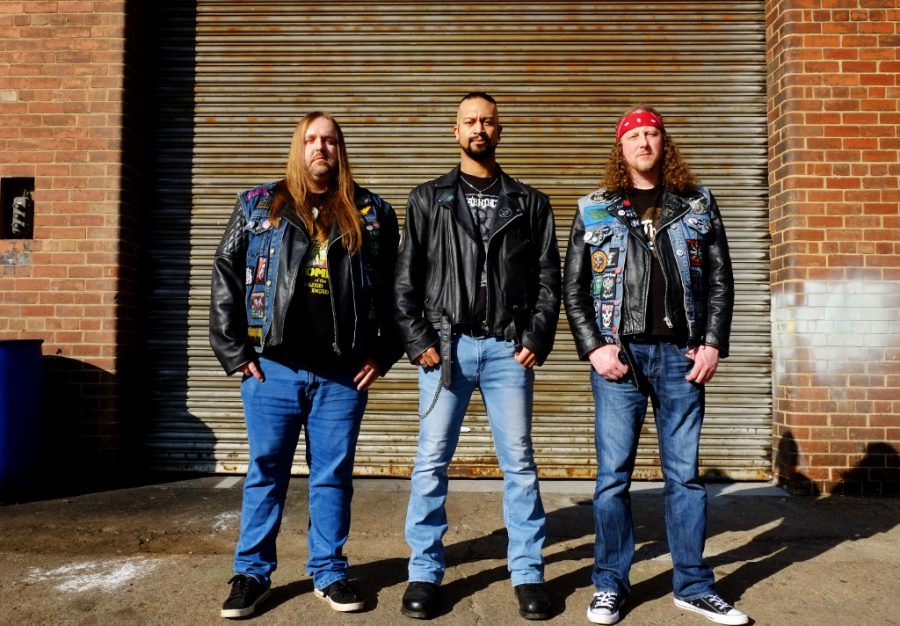
Sealey, I’ve seen you perform with Arkham Witch in Malta. The year after you performed with Desolate Pathway, in which band you are now active if I understand correctly? I get the feeling there’s a small group of bands that does a lot together, now also considering the spoken word part on ‘Excalibur’ by Simon Strange. Can you tell us something about that?
Sealey:
Yes, I am now the bassist and a full-time member of Desolate Pathway and I did help out Arkham Witch on bass for that one show at Malta Doom Metal Festival a few years ago. I’ve known Vince and Mags for a few years now and we first met when Iron Void played with Desolate Pathway in Stoke on Trent in the UK. I’m a massive fan of Pagan Altar and Vince used to play guitar for them before he formed Desolate Pathway. That drew me to them initially but I love the Epic Doom style they play and we’re currently in the process of writing a new album. It’s different to Iron Void but no less Doom. We’ll probably end up playing more shows together in future where I’ll be performing double duty on bass in both bands!
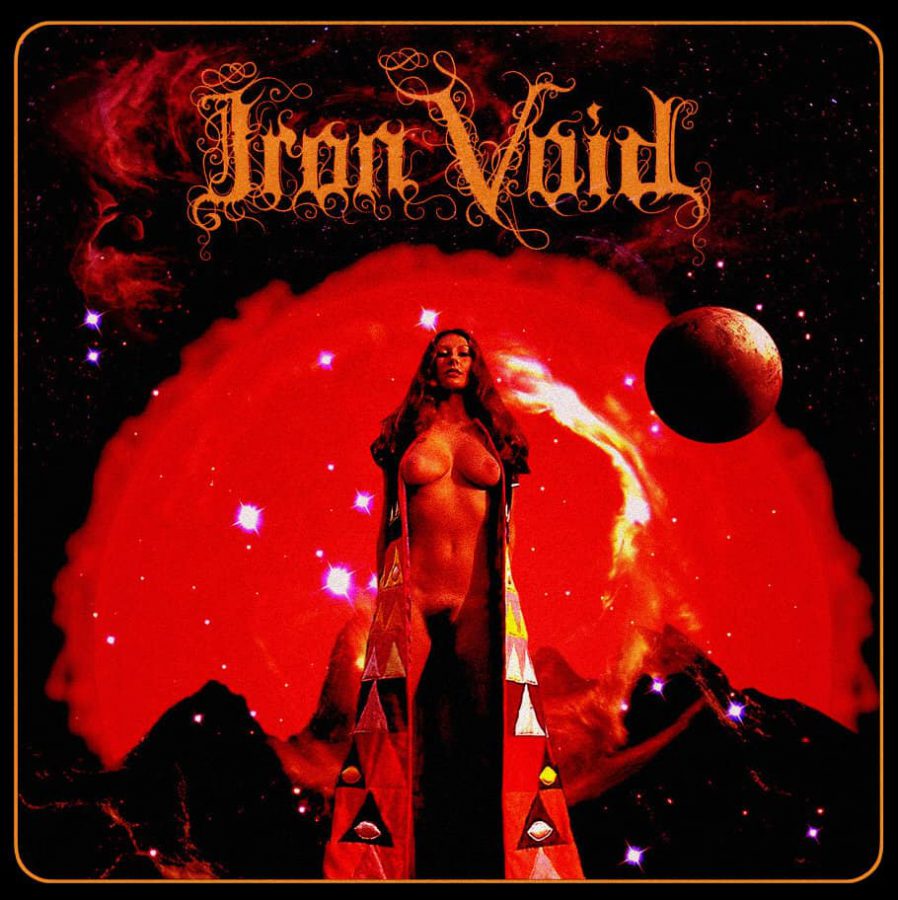
Steve and I have known Simon and Emma from Arkham Witch from when they were in The Lamp of Thoth, a band we had a lot of mutual respect for. Not only was their music top class arcane Doom Metal, they also featured Randy Reaper (a.k.a. Andy Whittaker, current Solstice guitarist) who also happened to be the guitarist in the original incarnation of Iron Void in the late 90’s. Iron Void also toured with Arkham Witch in the UK and Europe in 2013 and we’ve been good friends for a long time. So, you can see why there’s a special bond between us!
We needed someone to do the spoken word intro for Excalibur and we originally asked our good friend Luce Vee (Hooded Priest & King Heavy vocalist) to do it but his schedule was very busy and the clock was ticking for us as we needed to get the album completed and released. Our second choice was Simon Strange and he did an amazing job, he’s very theatrical so it suited the role perfectly as it’s Merlin in the film who is chanting the spell which is also known as “The Charm of Making”.
The music you make feels to me as a listener quite timeless. Its themes are not bound to the now, the sound is both classic and honest. What is it that attracts you as an artist to this genre so much? And what makes true doom true?
Sealey:
I’ve been listening to Doom Metal since my mid-teens. The first bands I got into were Cathedral, Sleep, Saint Vitus and Pentagram as well as Sabbath. I love other styles of Metal such as Death, Thrash and Black Metal but Doom is the purest form as it was the original style founded by Sabbath. There’s a real emotional honesty involved and it just resonates with me. In my opinion, True Doom has to be honest, brave, strong and emotionally heavy, it’s not just about distorted riffs and hard-hitting drums. Sometimes Doom can also be clean and quite fragile sounding too, it’s multi-faceted which I guess other forms of Metal fail to achieve for the most part. For example, Thrash is all about aggression and speed if you can understand the point I’m trying to make?
What future plans do you have with Iron Void?
Sealey:
We’re currently in the process of filming and putting together our first music video for “Lancelot of The Lake”. It’s taken longer than expected but there’s lot to it and we’ve had a line-up change and international shows to play which has slowed our progress a little. In our defence, we’re a Doom band, things happen gradually but it’ll be worth the wait, trust me! Ha, ha!
We’re planning on playing more UK and international shows with the new line-up and we’re starting to work on writing the follow up to “Excalibur” which will be entitled “IV”.
If you had to compare Iron Void to a dish, what would it be and why?
Sealey:
Now, this is a strange question! Ha, ha! If I did have to pick one though, it’d probably be a Mixed Grill. The reason being, we don’t just play one style of Doom Metal, we do try and mix up our tempos and ensure each song has its own individual flavour, if you will!
Steve:
I could say simple meat and potatoes. I suppose it is simple, but as Sealey says, there’s something else that we do that gives us a unique sound.
Scott:
I’d say a goulash or stew. An underrated dish, in that it can be both simplistic in its contents or very particular. It has a form of blanket appeal (in Europe at least, ha!) and is at its best when it’s a bit of a mixed bag of staple ingredients with a smattering of the more exotic and experimental.
Meer Iron Void:
Voor muziek van Iron Void ga je bijvoorbeeld naar Spotify, of juist naar Bandcamp, waar je de releases meteen ook kunt kopen. Gigs en meer info onder meer via de Facebook-pagina.
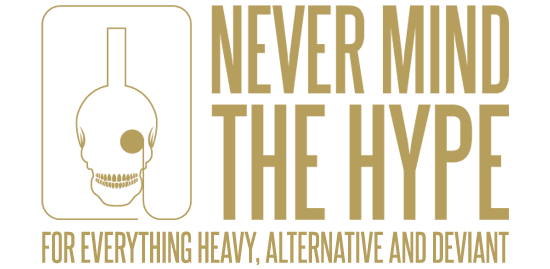
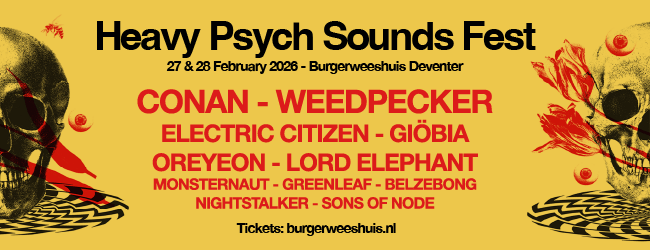
Nog geen reacties!
Er zijn nog geen reacties geplaatst.